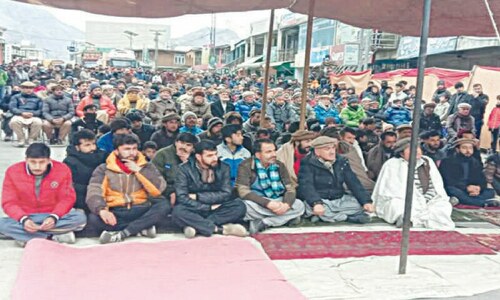ISLAMABAD: Planning Minister Ahsan Iqbal on Thursday said cross-border data sharing was critical for tackling issues like climate change and pandemics.
He was speaking at the Data for Development (D4D) symposium organised by the Sustainable Development Policy Institute (SDPI) and the United Nations Population Fund (UNFPA) which have partnered to implement the country’s first ‘Data for Development (D4D)’ initiative.
The initiative aims to strengthen capacities of government departments — particularly those of planning and development — by promoting evidence-based development planning across the country, with a special focus on provincial-level implementation.
The minister said achieving Sustainable Development Goals (SDGs) by 2030 required accurate, reliable and timely data, as 68pc of the goals depend on it. However, he said, Pakistan faced significant challenges in this area.
“For instance, Pakistan Bureau of Statistics (PBS) had recently highlighted a 22pc gender gap in female school enrollment in the urban areas,” he said.
Ahsan Iqbal said data had also enabled positive outcomes in Pakistan, such as reducing electricity theft, ensuring targeted aid distribution through Benazir Income Support Programme (BISP), and predicting monsoons with 90pc accuracy.
He said that AI ethics frameworks and inclusive data systems were being prioritised to ensure fairness in decision-making, adding that the decisions we make today about data governance and ethics will shape Pakistan’s future.
Chairman Board of Governors, SDPI, Ambassasdor Shafqat Kakakhel said there were many entities that contributed to successful and effective data systems.
He said one of the major objectives of this symposium was to help stakeholders understand in greater detail what had been achieved through data.
“This includes improving governance frameworks, health facility support, and fostering a culture of collaboration. There’s a strong emphasis on capacity building for academics and designing structured agendas for development,” Mr Kakakhel said.
He further said the symposium aimed to bring together government representatives, academia and partnering countries to establish a unified, sustainable and scalable approach to policymaking.
Initiative Lead D4D, DED SDPI, Dr Sajid Amin Javed said this programme emphasised data planning based on accurate, effective, and true data, unlike the unreliable data we had seen in the past.
“Everyone involved in this project is integral to its success. I was glad to see such a positive response and support from those invited to participate,” he added.
Dr Sajid Amin said while UNFPA and SDPI would always support this project, the provinces need to take ownership and carry it forward.
UNFPA representative Dr Luay Shabaney said without transforming data into actionable knowledge, it is of limited value.
Published in Dawn, December 13th, 2024












































Dear visitor, the comments section is undergoing an overhaul and will return soon.